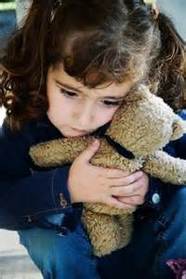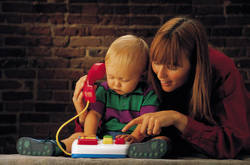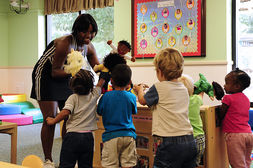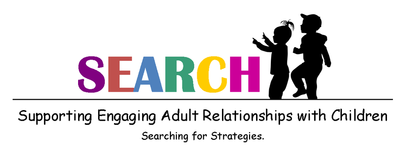Current, Funded Research Projects
Early Learning System Initiative (ELSI)
To develop and implement a center to serve the early childhood education workforce in Oregon.The new center will provide support and training from an anti-bias, culturally responsive lens to better equip educators who care for children from marginalized populations and for children who have experienced trauma. I lead the Coaching Core, which is working with partners to develop two primary initiatives to support coaching activities within Oregon early care and education systems: Mentor Coaching Framework and Oregon Coaching Competencies.
My role: Co-Principal Investigator, Coaching Core Faculty Lead
Collaborators: Megan McClelland (Co-PI), Shauna Tominey (Co-PI), Megan Pratt (Co-PI), Oregon State University & Shannon Lipscomb (Co-I), Oregon State University Cascades
Status: Active
Funder: Oregon Department of Education Early Learning Division
Publications and press releases:
My role: Co-Principal Investigator, Coaching Core Faculty Lead
Collaborators: Megan McClelland (Co-PI), Shauna Tominey (Co-PI), Megan Pratt (Co-PI), Oregon State University & Shannon Lipscomb (Co-I), Oregon State University Cascades
Status: Active
Funder: Oregon Department of Education Early Learning Division
Publications and press releases:
- Oregon Coaching Competencies
- News Story/Press release here
ECE Inclusion – Coaching Collaborative/Cross Sector Teams
To advance embedded professional development across the early learning system to ensure early care and education workforce have the supports needed to fully include children with disabilities and implement evidence-based practices. This work is centered on the National Inclusion Indicators and the Pyramid Model and is in partnership with Oregon Department of Education.
My role: Co-Principal Investigator (lead)
Collaborators: Megan McClelland (Co-PI), Sam Logan (Co-I), and Will Massey (Co-I), Oregon State University; Meredith Villines, Oregon Department of Education
Status: Active
Funder: Oregon Department of Education
My role: Co-Principal Investigator (lead)
Collaborators: Megan McClelland (Co-PI), Sam Logan (Co-I), and Will Massey (Co-I), Oregon State University; Meredith Villines, Oregon Department of Education
Status: Active
Funder: Oregon Department of Education
Evaluating Child Care Development Block Grant (CCDBG) in Oregon: Impact of the 2014 Act on Children, Families, and the Quality of Home-based Care in Oregon (Phase II/Implementation Grant)
This project aims to leverage administrative data to identify the impacts of the Reauthorization of the CCDBG on Oregon children, families, and early educators. Additionally, we are investigating the effectiveness of two professional development programs. The first, for license exempt providers, uses newly developed resources by our team to support these educators. The second, tests the efficacy of a focused child care network model, developed by our team, for home-based early educators. This work represents a state-research partnership with the Oregon Department of Education Early Learning Division.
My role: Co-Principal Investigator
Collaborators: Megan Pratt (PI) & Bobbie Weber, Oregon State University; Sidney Traen & Jennifer Mendoza, Oregon Department of Education Early Learning Division
Status: Active
Funder: Administration of Children & Families, Office of Research, Planning, & Evaluation
My role: Co-Principal Investigator
Collaborators: Megan Pratt (PI) & Bobbie Weber, Oregon State University; Sidney Traen & Jennifer Mendoza, Oregon Department of Education Early Learning Division
Status: Active
Funder: Administration of Children & Families, Office of Research, Planning, & Evaluation
Red Light, Purple Light! Evaluating a self-regulation intervention for children in early learning settings
This project will test the initial efficacy of Red Light, Purple Light (RLPL), a self-regulation intervention that was developed as part of an IES grant. The RLPL intervention is designed to promote children's school readiness and is implemented by early childhood educators in early learning settings.
My role: Co-Investigator (lead for Implementation Support)
Collaborators: Megan McClelland (PI; Oregon State University). Co-PIs: J. Geldhof & S. Tominey (Oregon State University), S. Schmitt (Purdue University), Co-Is: T. Li (Oregon State University) & A. Mashburn (Portland State University)
Status: Active
Funder: Institute of Education Sciences (link for more information)
My role: Co-Investigator (lead for Implementation Support)
Collaborators: Megan McClelland (PI; Oregon State University). Co-PIs: J. Geldhof & S. Tominey (Oregon State University), S. Schmitt (Purdue University), Co-Is: T. Li (Oregon State University) & A. Mashburn (Portland State University)
Status: Active
Funder: Institute of Education Sciences (link for more information)
Completed Projects
Partnership for Prekindergarten improvement
In partnership with the Oregon Department of Education Early Learning Division, this state-research partnership aims to identify ways in which Oregon's state-funded preschool programming (Oregon PreK and Preschool Promise) may best use job-embedded professional learning to support continuous quality improvement. We work closely with our state partners to gather and use information to continuously improve preschool programming.
My role: Co-Principal Investigator
Collaborators: Dr. Katherine Pears, Oregon Social Learning Center & Dr. Beth Green, Portland Sate University (Co-PIs)
Status: Data Analysis/Project closed
Funder: Bill and Melinda Gates Foundation and Cultivate Learning
Selected publications:
My role: Co-Principal Investigator
Collaborators: Dr. Katherine Pears, Oregon Social Learning Center & Dr. Beth Green, Portland Sate University (Co-PIs)
Status: Data Analysis/Project closed
Funder: Bill and Melinda Gates Foundation and Cultivate Learning
Selected publications:
Home-based Child Care Providers: An exploration of motivation and Identity
This project quantitatively and qualitatively explores value-based motivation, persistence, and professional identity among Oregon’s Registered family child care providers in relation to their decisions to engage in childcare systems and resource procurement (e.g., in response to COVID; subsidy participation; continuous quality improvement).
My role: Faculty Mentor. Adrienne Henry, my former graduate student, was awarded this grant for her dissertation and is the project lead.
Status: Data Analysis/Project closed
Funding: President’s Commission on the Status of Women (PCOSW), Oregon State University
My role: Faculty Mentor. Adrienne Henry, my former graduate student, was awarded this grant for her dissertation and is the project lead.
Status: Data Analysis/Project closed
Funding: President’s Commission on the Status of Women (PCOSW), Oregon State University
Using Online Learning and Coaching to Increase the Competency of Early Childhood Teachers to Impact School Readiness for Children Exposed to Trauma

The long-term goal of the proposed project is to create and disseminate an innovative and effective online professional development program (course and coaching) that helps teachers working in different types of ECE programs to improve social, behavioral, and academic indicators of school readiness for young children who have experienced trauma. Click on this link to learn more about our professional program, Roots of Resilience, Teachers Awakening Children's Healing.
My role: Co-investigator (CO-I)
Collaborators: Dr. Shannon Lipscomb (PI; Oregon State University-Cascades). Co-Is: Drs. Berry & Fisher (UofO),
Status: Data Analysis
Funding: Institute of Education Sciences, U.S. Department of Education Award Number: R305A150107
Selected Publications:
- Impacts of Roots of Resilience professional development for early childhood teachers on young children's protective factors
- Adverse childhood experiences and children's development in early care and education programs
The project explores potential relations between toddler teachers’ overall health and well-being and classroom quality. This project is especially interested in exploring connections between three occupational health risks for center-based toddler teachers: infectious disease, musculoskeletal strain, and psychosocial stress, and the early childhood classroom environment. This type of information can help inform early childhood quality improvement initiatives like Oregon’s Quality Rating and Improvement System (QRIS), to support the health and well-being of child care workers, thereby positively impacting the children and families they serve.
More information about the Professional Training Opportunities Program (PTOP) Awardees presentations at NOHC.
My role: Faculty Mentor. Adrienne Henry, my graduate student, was awarded this grant for her thesis and is the project lead.
Status: Closed
Funding: Professional Training Opportunities Program (PTOP) in Occupational Health and Safety, University of Washington
Publications:
More information about the Professional Training Opportunities Program (PTOP) Awardees presentations at NOHC.
My role: Faculty Mentor. Adrienne Henry, my graduate student, was awarded this grant for her thesis and is the project lead.
Status: Closed
Funding: Professional Training Opportunities Program (PTOP) in Occupational Health and Safety, University of Washington
Publications:
Evaluating Child Care Development Block Grant (CCDBG) in Oregon: Impact of the 2014 Act on Children, Families, and the Quality of Home-based Care in Oregon (Phase I/PLanning Grant)
This project aimed to increase Oregon's capacity to support home-based child care providers and the families and children they serve. We aim to increase the capacity of our administrative data to identify how implementation of the 2014 Act impacts families and providers and to create professional development supports for home-based providers.
My role: Co-Principal Investigator (on Oregon State University subcontract)
Collaborators: Dr. Bobbie Weber (PI on OSU subcontract) & Deanna Grobe, Oregon State University; Dr. Shannon Lipscomb, Oregon State University-Cascades; Tom George (PI) & Dawn Woods, Oregon State Department of Education, Early Learning Division
Status: Closed
Funder: Administration of Children & Families, Office of Research, Planning, & Evaluation, summary here
My role: Co-Principal Investigator (on Oregon State University subcontract)
Collaborators: Dr. Bobbie Weber (PI on OSU subcontract) & Deanna Grobe, Oregon State University; Dr. Shannon Lipscomb, Oregon State University-Cascades; Tom George (PI) & Dawn Woods, Oregon State Department of Education, Early Learning Division
Status: Closed
Funder: Administration of Children & Families, Office of Research, Planning, & Evaluation, summary here
Evaluation of the Live & LEarn Parenting Series
The purpose of this project is to discover if participation in a Live and Learn parenting series is associated with parent and child behaviors. Specifically, we are interested if the participation in the parenting education series is linked to increases responsive parent-child interactions, and young children's social and emotional skills.
My role: Principal Investigator
Status: Closed
Collaborator(s): Dr. Shauna Tominey, Oregon State University
Funding: Oregon Community Foundation
My role: Principal Investigator
Status: Closed
Collaborator(s): Dr. Shauna Tominey, Oregon State University
Funding: Oregon Community Foundation
Red Light, Purple Light! Developing a Self-Regulation Intervention for Children at Risk for School Difficulty
The purpose of this project is to develop and evaluate the promise of a self-regulation intervention designed for use with children from low-income backgrounds with the goal of promoting the development of school readiness skills. Math and literacy content will be embedded into self-regulation based classroom, whole group activities to explore the added benefit of academic content on the development of self-regulation skills. Teachers will be supported with online, video-coaching during implementation.
My role: Co-investigator (Co-I)
Collaborators: Megan McClelland (PI; Oregon State University). Co-Is: S. Tominey (Oregon State University), S. Schmitt & D. Purpura (Purdue University), & K. Thompson (Oregon State University)
Status: Completed
Funding: Institute of Education Sciences, U.S. Department of Education, R305A150196
Selected Publications:
My role: Co-investigator (Co-I)
Collaborators: Megan McClelland (PI; Oregon State University). Co-Is: S. Tominey (Oregon State University), S. Schmitt & D. Purpura (Purdue University), & K. Thompson (Oregon State University)
Status: Completed
Funding: Institute of Education Sciences, U.S. Department of Education, R305A150196
Selected Publications:
Understanding Children's Unique Experiences and Interactions in the Early Childhood Classroom: A Focus on Children's Biology, Behavior, & Emotion

The project explores potential relationships between child characteristics, teacher-child and peer interactions, and children’s stress responses. Since a child’s experience is heavily influenced by interactions within his/her environment, the purpose of this project is to identify aspects of the classroom and child that prevent stress in preschool children, and support close teacher-child and peer relationships. This type of information can help to inform best practices for children as well as assist in creating professional development for early care and education professionals to best support children, teachers, and families.
My role: Principal Investigator
Status: Data analysis
Funding: Oregon State University General Research Fund, OSU Social & Behavioral Health Sciences (start-up funds)
Publications:
Daily Experiences for Very Young Children in Early Care and Education
This project aims to understand how very young children (15-36 months) engage in classroom activities, interact with peers and teachers, and regulate emotion and behavior in the classroom.
My role: Principal Investigator
Collaborator: Dr. Sam Logan, Oregon State University
Status: Data Analysis
Funding: OSU Social & Behavioral Health Sciences (start-up funds)
My role: Principal Investigator
Collaborator: Dr. Sam Logan, Oregon State University
Status: Data Analysis
Funding: OSU Social & Behavioral Health Sciences (start-up funds)
Parent-Child Interactions and Parent Stress after a Parenting Education Series

The purpose of this project is to discover if participation in a parenting series is associated with mother and child behaviors. Specifically, we are interested if the participation in the parenting education series is linked to 1) reductions in mother's stress, measured via salivary cortisol, 2) increases responsive mother-child interactions, and 3) decreases children’s behavioral challenges. To measure stress, responsive interactions, and children’s behavior, we employ four methods: behavioral observations of mother-child play, mothers’ saliva samples, surveys, and child direct assessments.
My role: Principal Investigator
Status: Data Analysis
Collaborator(s): Dr. John Geldhof, Oregon State University
Funding: Ford Family Foundation
My role: Principal Investigator
Status: Data Analysis
Collaborator(s): Dr. John Geldhof, Oregon State University
Funding: Ford Family Foundation
Preschool children’s adaptations of the stress response system following a teacher-child relationship focused intervention
As part of a larger project (Preschool Relationships Enhancement Project) investigating the effect of Banking Time on teacher-child relationships and child behavior, we conducted a substudy to examine children's change in cortisol after participating in Banking Time. Results indicate that children with disruptive behaviors showed a decline in cortisol across the day at child care after participating in the intervention compared to children in the control group.
Journal abstract
News stories about these findings:
Boston Globe
Science Daily
Funding for this study's subsample: American Psychological Association (APA) Early Career Research Award from the Educational Psychology Division. PI: Dr. Bridget Hatfield; faculty mentor: Dr. Amanda Williford
Funding for PREP: U.S. Department of Education Institute of Education Sciences National Center for Special Education Research (NCSER). PI: Dr. Amanda Williford, University of Virginia
Journal abstract
News stories about these findings:
Boston Globe
Science Daily
Funding for this study's subsample: American Psychological Association (APA) Early Career Research Award from the Educational Psychology Division. PI: Dr. Bridget Hatfield; faculty mentor: Dr. Amanda Williford
Funding for PREP: U.S. Department of Education Institute of Education Sciences National Center for Special Education Research (NCSER). PI: Dr. Amanda Williford, University of Virginia
If you are an undergraduate student at Oregon State University and are interested in being a part of our research team, please contact us at [email protected]


